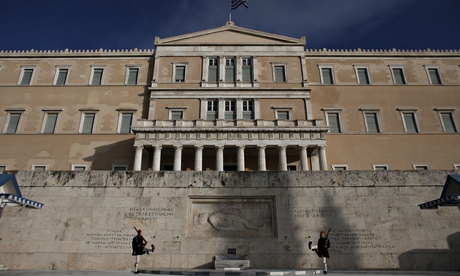Syriza’s anti-austerity programme is more sensible than radical, and what Greece needs. But the EU is far from convinced

The Greek parliament has failed to elect a new president and the country’s constitution dictates that there should now be parliamentary elections. These will be critical for Greece and also important for Europe. A victory for Syriza, the main leftwing party, would offer hope that Europe might, at last, begin to move away from austerity policies. But there are also grave risks for Greece and the European left.
The rise of Syriza is a result of the adjustment programme imposed on Greece in 2010. The troika of the European Commission, the European Central Bank (ECB) and the International Monetary Fund (IMF) provided huge bailout loans, with the cost of unprecedented cuts in public expenditure, tax increases and a collapse in wages. It was a standard, if extreme, austerity package, with one vital difference: austerity could not be softened by devaluing the currency as, for instance, had happened in the Asian crisis of 1997-98. Greek membership of the euro had closed all escape routes.
Brutal austerity succeeded in stabilising Greece and keeping it in the economic and monetary union by destroying its economy and society. The budget deficit has been drastically reduced, the current account deficit has turned into a surplus and the prospect of default on foreign debt has receded. But GDP has contracted by 25%, unemployment has shot above 25%, real wages have fallen by 30% and industrial output has declined by 35%. The human cost has been immeasurable, amounting to a silent humanitarian crisis. Homelessness has rocketed, primary healthcare has collapsed, soup kitchens have multiplied and child mortality has increased.
Since the summer of 2014, the depression has been drawing to a close, helped by the strong performance of the tourist sector. Yet, the damage from troika policies is so severe that growth prospects are appalling. The weakness is manifest in foreign trade, which the IMF expected to act as the “engine of growth”. In 2014, Greek exports will probably contract, while imports began to rise as soon as the depression showed signs of ending. This is a deeply dysfunctional economy.
In the midst of this catastrophe, the troika is insisting on further austerity to achieve massive primary budget surpluses of 3% in 2015, 4.5% in 2016 and even more in future years. Its purpose is to service the enormous foreign debt, which has risen to 175% of GDP from about 130% in 2009. Astonishingly, the IMF still expects Greece to register average growth of 3.4% during the next five years – provided, of course, that it goes full speed ahead with privatisation, deregulation of labour and market liberalisation. The troika has truly embraced the economics of the absurd.
In 2010-11, the Greek people actively opposed the disastrous policies of the troika and its domestic allies, but failed to stop them. After 2012, however, as unemployment and poverty escalated, it became difficult to organise popular protest. Still, exhaustion with troika policies is so great that voters have turned in droves to the left, in the hope that Syriza will offer a better future.
Syriza promises first to achieve a substantial write-off of Greek debt and, second, to lift austerity by aiming for balanced budgets, instead of the surpluses demanded by the troika. It will reconnect families to the electricity network, provide food relief and shelter the homeless. It will take immediate action to reduce unemployment through public programmes. It is committed to lowering the enormous tax burden and to boosting public investment in an effort to accelerate growth.
There is nothing radical, much less revolutionary, in these policies. They represent modest common sense and would open a fresh path for other European countries. After all, Syriza has repeatedly declared its intention to keep the country within the economic and monetary union, and to avoid unilateral actions. There is little doubt that its leaders are committed Europeanists who truly believe that they could help transform the EU from within.
The trouble is that the EU is far from amenable to Syriza’s ideas. Germany’s exporters and banks have benefitted substantially from the euro and have no incentive to abandon austerity. Berlin has its plate full anyway as the eurozone is exhibiting renewed weakness, with France and Italy on the ropes. There is also Mario Draghi at the ECB,rambling on about quantitative easing, a policy that Berlin detests. The last thing that Germany would welcome would be Syriza and its programme.
A scaremongering campaign is likely in the coming weeks to deter Greeks from voting for the leftwing party. Should the campaign fail, a Syriza government can expect hostility from the EU, which is not short of weapons. Syriza’s programme is sensible and modest, but lacks secure funding. Greece also needs substantial finance to service its debts in 2015, perhaps up to €20bn. There are some debt repayments in the spring that might be manageable, but further repayments – €6.7bn – must be made in July-August, which will need fresh funding from abroad. And, needless to say, Greek banking would be rapidly asphyxiated if the ECB stopped providing liquidity.
A Syriza government will probably face an ultimatum to capitulate, perhaps by being offered some watered-down version of austerity. This would be a disaster for Greece and a major defeat for opponents of austerity in Europe. It is vital that Syriza wins and applies its programme without flinching, helped by international support. The battle lines are forming in Greece.
